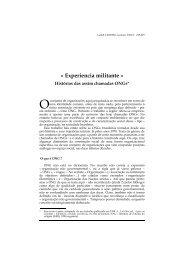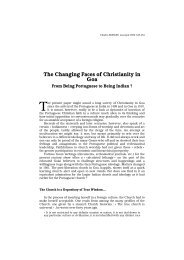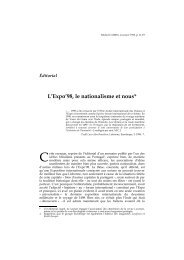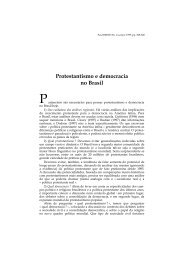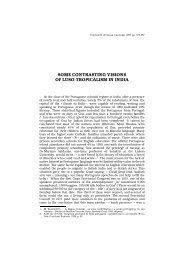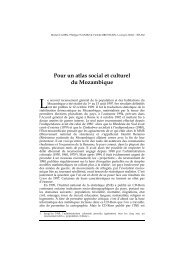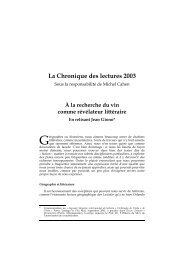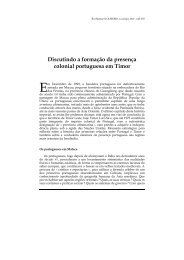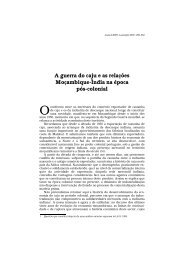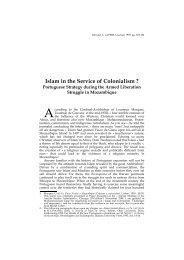The Denationalisation of Goans - Lusotopie
The Denationalisation of Goans - Lusotopie
The Denationalisation of Goans - Lusotopie
You also want an ePaper? Increase the reach of your titles
YUMPU automatically turns print PDFs into web optimized ePapers that Google loves.
Nishtha DESAI, <strong>Lusotopie</strong> 2000 : 469-476<br />
<strong>The</strong> <strong>Denationalisation</strong> <strong>of</strong> <strong>Goans</strong><br />
An Insight into the Construction <strong>of</strong> Cultural Identity*<br />
Tristao de Braganza Cunha (1891-1958) 1 , henceforth referred to as<br />
Cunha, authored an essay, <strong>The</strong> Denationalization <strong>of</strong> <strong>Goans</strong>, published in<br />
1944 as a booklet 2 . This essay gives a sharp critique <strong>of</strong> the psychological<br />
dominance <strong>of</strong> Portuguese culture over the educated people <strong>of</strong><br />
Goa. It gives an insight into the construction <strong>of</strong> identities in the context <strong>of</strong><br />
Portuguese colonial rule from the standpoint <strong>of</strong> an Indian nationalist. This<br />
is the subject matter <strong>of</strong> this presentation. Cunha, constructed a thesis <strong>of</strong><br />
denationalisation, identifying it as the main obstacle for the development <strong>of</strong><br />
nationalism in Goa. As a result <strong>of</strong> this essay, the term « denationalisation »<br />
entered the vocabulary <strong>of</strong> almost every freedom fighter in Goa.<br />
<strong>The</strong> Use <strong>of</strong> the Term « <strong>Denationalisation</strong> »<br />
It is not clear how Cunha came to use the term « denationalisation ». It<br />
was not a popularly used term, but one has come across being used in two<br />
different ways. Keshab Chandra Sen and Aurobindo Ghose have used the<br />
term to describe the efforts <strong>of</strong> the British to alienate the Indian people from<br />
their own culture 3 . <strong>The</strong> Portuguese state used it to denote those who<br />
expressed any dissent against it. In 1914, arguing in favour <strong>of</strong> imparting<br />
primary education in the mother-tongue, konkani, rather than Portuguese,<br />
Menezes Braganza asserted that it was the perceived « danger <strong>of</strong><br />
* This paper contains ideas from my doctoral thesis, Tombat, Nishtha (alias Nishtha Desai),<br />
Tristao de Braganza-Cunha (1891-1958) and the Rise <strong>of</strong> Nationalist Consciousness in Goa, Dept <strong>of</strong><br />
Sociology, Goa University, February 1995.<br />
1. Tristao de Braganza-Cunha (1891-1958) is popularly known as the Father <strong>of</strong> Goan nationalism.<br />
He established the Goa Congress Committee in Goa in 1928 which represented the first<br />
organised attempt to achieve Goa’s liberation from Portuguese colonialism.<br />
2. See T.B. Cunha, Goa’s Freedom Struggle, Bombay, Dr T.B. Cunha Memorial Committee,<br />
1961 : 55-98.<br />
3. In the mid-1870s Keshab Chandra Sen remarked : « Truth is not European, and it would be a<br />
mistake to force European institutions upon the Hindus, who would resist any attempt to<br />
denationalise them » (P. CHATTERJEE & P. GYANENDRA, Subaltern Studies. VII : Writings on<br />
South Asian History and Society, New Delhi, Oxford University Press, 1993 : 40). Around 1910,<br />
Aurobindo Ghose in an editorial in Karmayogin lamented on how Indian intellectuals were<br />
unfamiliar with the « deep knowledge » <strong>of</strong> their forefathers : « … so well has British<br />
education done its total denationalising work in India » (V. GROVER, Political Thinkers <strong>of</strong><br />
India. Vol II : Sri Aurobindo Ghose, New Delhi, Deep and Deep Publications, 1992).
470 Nishtha DESAI<br />
denationalisation » with which Portuguese <strong>of</strong>ficialdom was so preoccupied,<br />
which prevented it from encouraging konkani 4 . In the satyagraha <strong>of</strong> 1955<br />
hundreds <strong>of</strong> Indians marched into Goa to demonstrate against the<br />
artificiality <strong>of</strong> the border separating Goa from India. Salazar referred to the<br />
<strong>Goans</strong> who took part in this action as « denationalised <strong>Goans</strong> » 5 . One<br />
cannot say whether Cunha’s use <strong>of</strong> the term was inspired by earlier<br />
nationalists or whether he adopted its usage in a paradoxical manner<br />
reacting to the Portuguese <strong>of</strong>ficialdom’s usage <strong>of</strong> it.<br />
A Brief Summary <strong>of</strong> <strong>The</strong> Denationalization <strong>of</strong> <strong>Goans</strong><br />
At the outset it is worth noting that Cunha’s discourse in general, and<br />
his thesis <strong>of</strong> the denationalisation <strong>of</strong> <strong>Goans</strong> in particular are a product <strong>of</strong> the<br />
divided society in which he lived and attempted to generate national<br />
consciousness. He tried to unite the people by appealing to their identity as<br />
Indians. His discourse is meaningful because it addresses the fact <strong>of</strong> the<br />
communal divide without attempting to hide its existence. According to<br />
Cunha, Hindus and Catholics were both denationalised, however because<br />
<strong>of</strong> the use <strong>of</strong> the Church by the Portuguese state the denationalisation <strong>of</strong> the<br />
Catholic <strong>Goans</strong> was more pronounced.<br />
Cunha argues that the Portuguese state had achieved the alienation <strong>of</strong><br />
the people from their motherland through various agencies such as the<br />
Portuguese system <strong>of</strong> education, the press which was under the rigid<br />
control <strong>of</strong> the state and the Church which functioned as an arm <strong>of</strong> the<br />
Portuguese state.<br />
A major premise in Cunha’s essay was that <strong>Goans</strong> had lost their<br />
Indianness and their pride <strong>of</strong> race. National consciousness was absent. In<br />
place <strong>of</strong> their own culture the people <strong>of</strong> Goa, particularly the Catholic elite,<br />
had adopted a culture that was imitative <strong>of</strong> the west. <strong>The</strong> process <strong>of</strong> denationalisation<br />
had reduced <strong>Goans</strong> to being strangers in their own land 6 . He<br />
identified the denationalisation <strong>of</strong> <strong>Goans</strong> as the main obstacle for the<br />
development <strong>of</strong> nationalism in Goa.<br />
He asserted that the Portuguese created myths which dominated the<br />
historiography <strong>of</strong> their rule over Goa. <strong>The</strong> result <strong>of</strong> this was that <strong>Goans</strong> who<br />
had received Portuguese education grew up believing Afonso de<br />
Albuquerque to be tolerant and in favour <strong>of</strong> racial integration, and<br />
nurtured the belief that Francis Xavier had effected conversions<br />
miraculously. Portuguese historiography chose to ignore the fact that the<br />
former was responsible for the massacre <strong>of</strong> thousands <strong>of</strong> Muslims, while<br />
the latter had played a vital role in introducing the inquisition in Goa.<br />
Anything pertaining to India was excluded from the curriculum. Fed on<br />
myths such as these most <strong>Goans</strong> were in awe <strong>of</strong> the Portuguese.<br />
Denationalised <strong>Goans</strong> had lost their national dignity, he argued. <strong>The</strong>y<br />
had lost their traditional culture and were deprived <strong>of</strong> the use <strong>of</strong> their<br />
mother-tongue, Konkani. <strong>The</strong>y held the belief that by aping the culture <strong>of</strong><br />
the rulers, their status was superior to their fellow countrymen.<br />
4. Menezes Braganza Memorial Committee, Biographical Sketch – Menezes Braganza, Panaji, self<br />
published, 1972 : 58.<br />
5. Salazar Says – <strong>The</strong> Question <strong>of</strong> Goa, Statement from the Presidency <strong>of</strong> the Council <strong>of</strong> Ministers,<br />
Secretariado nacional da informação, Lisbon, 1955 : 5.<br />
6. T.B. CUNHA, op. cit. : 59.
<strong>The</strong> <strong>Denationalisation</strong> <strong>of</strong> <strong>Goans</strong> 471<br />
<strong>The</strong> <strong>Denationalisation</strong> <strong>of</strong> <strong>Goans</strong> is <strong>of</strong>ten seen as an indictment <strong>of</strong> Catholic<br />
<strong>Goans</strong>. This is not true. Highlighting the nexus between the church and the<br />
state Cunha asserts :<br />
« We do not fight religion but we expose the exploitation <strong>of</strong> religion for the<br />
benefit <strong>of</strong> the foreign rulers and to the disadvantage <strong>of</strong> India’s unity » 7 .<br />
Cunha remarks that, more than any other imperialist rulers, « the<br />
Portuguese used religion as a weapon <strong>of</strong> political exploitation », and urges<br />
the Goan Catholic, to « be conscious <strong>of</strong> and think over the role assigned to<br />
religion by imperialistic politics » 8 . However, he clearly states that Goan<br />
Catholics Hindus had been denationalised and observes : « In the name <strong>of</strong><br />
religion, the Hindus were robbed and the Catholics enslaved. Both were<br />
terrorised for the greater security <strong>of</strong> the usurpers » 9 . He attributed to their<br />
denationalisation the failure <strong>of</strong> <strong>Goans</strong> to protest against the colonial rulers.<br />
He states in no uncertain terms :<br />
« <strong>The</strong> regime <strong>of</strong> permanent violence <strong>of</strong> the people’s convictions produced a<br />
debasement <strong>of</strong> moral qualities. And it affected both the Hindus and<br />
Christians […] It destroyed their self-respect and enslaved them to the point<br />
<strong>of</strong> rendering them incapable <strong>of</strong> reacting to the tyranny <strong>of</strong> their rulers » 10 .<br />
It is worth noting that in this essay, when Cunha has a specific point to<br />
make about Goan Catholics, he refers to « the Catholic population » or<br />
« Goan Christians ». <strong>The</strong> more frequent reference is to « <strong>Goans</strong> », inclusive<br />
<strong>of</strong> Hindus and Catholics.<br />
By targeting denationalisation, rather than the tangible enemy, the<br />
imperial state, Cunha showed an understanding <strong>of</strong> complexities involved in<br />
advancing the nationalist idea. « Nationalism » could only exist in the<br />
absence <strong>of</strong> psychological and cultural enslavement.<br />
Significance <strong>of</strong> <strong>The</strong>sis <strong>of</strong> <strong>Denationalisation</strong><br />
According to Cunha’s thesis, the expression <strong>of</strong> nationalism necessarily<br />
implied an assertion <strong>of</strong> culture on the part <strong>of</strong> the colonised. Ashis Nandy<br />
has cited Frantz Fanon (1926-1961), psychiatrist and social philosopher,<br />
involved in Algeria’s liberation struggle, to be one <strong>of</strong> the first to realise the<br />
psychological dominance <strong>of</strong> European middle-class cultures in the<br />
colonies 11 . However, Cunha’s essay, which emphasises the mental<br />
enslavement <strong>of</strong> <strong>Goans</strong> by the Portuguese, was written two decades prior to<br />
Fanon’s first published work 12 . Cunha and Fanon both believed that the<br />
educated elites <strong>of</strong> their respective countries had been subjected to a process<br />
<strong>of</strong> mental enslavement, enabling the colonial rulers to sustain their rule over<br />
the colonised with their consent.<br />
07. Ibid. : 57.<br />
08. Ibid. : 77.<br />
09. Ibid. : 76.<br />
10. Ibid. : 96.<br />
11. A. NANDY, <strong>The</strong> Intimate Enemy : Loss and Recovery <strong>of</strong> Self Under Colonialism, New Delhi,<br />
Oxford University Press, 1983 : 4.<br />
12. Fanon’s noted works are Black Skins, White Masks and Wretched <strong>of</strong> the Earth, published in 1952<br />
and 1961 respectively.
472 Nishtha DESAI<br />
Nandy is concerned with the colonisation <strong>of</strong> minds that persists after the<br />
departure <strong>of</strong> the colonisers which results in the generalisation <strong>of</strong> « the<br />
concept <strong>of</strong> the modern west from a geographical and temporal entity to a<br />
psychological category » 13 . Cunha’s concern was with the strength, persistence<br />
and even seeming popularity <strong>of</strong> ongoing colonial domination because<br />
the mind <strong>of</strong> the people had been enslaved.<br />
This concern is also reflected in the language <strong>of</strong> Amílcar Cabral, a<br />
thinker-revolutionary fighting for Guinea Bissau’s liberation from<br />
Portuguese colonial rule. He asserted « Liberation is an act <strong>of</strong> culture ». He<br />
believed it necessary to penetrate the « wall <strong>of</strong> silence » built around the<br />
colonised people by the Portuguese colonisers and to bare the attempt <strong>of</strong><br />
the Portuguese to project the colonised Africans as « happy Portuguese <strong>of</strong><br />
colour. » Cabral referred to « the ineffaceable marks <strong>of</strong> colonialism » on the<br />
minds and bodies <strong>of</strong> the people 14 .<br />
Cunha asserted the necessity <strong>of</strong> <strong>Goans</strong> to affirm their endogenous<br />
culture. This would facilitate the growth <strong>of</strong> nationalism. « Forced<br />
westernisation » had resulted in the creation <strong>of</strong> « submissive servants » 15<br />
and their denationalised culture had made the <strong>Goans</strong> « the tools <strong>of</strong> their<br />
own enslavement » 16 . Consequently for nationalist consciousness to<br />
develop in <strong>Goans</strong> it was necessary for them to identify with the « Great<br />
India » from which the origins <strong>of</strong> Goa could be traced. For Cunha,<br />
acceptance <strong>of</strong> the « Great India » is not just a political concept but a cultural<br />
concept implying a rejection <strong>of</strong> the superiority <strong>of</strong> the west and a vigorous<br />
reaction against the colonial rulers in the « political, ideological, social and<br />
economic fields, and even in the most everyday habits <strong>of</strong> our life » 17 .<br />
Popular Perception <strong>of</strong> the « Denationalised Goan »<br />
In the course <strong>of</strong> research for my doctoral thesis, a number <strong>of</strong> freedom<br />
fighters were interviewed. For them, Cunha was best remembered for his<br />
formulation <strong>of</strong> the thesis <strong>of</strong> <strong>The</strong> <strong>Denationalisation</strong> <strong>of</strong> <strong>Goans</strong>. However it<br />
became clear in the course <strong>of</strong> the interviews that their understanding <strong>of</strong> his<br />
essay was informed by their practical experiences or their biases and they<br />
had selectively appropriated parts <strong>of</strong> Cunha’s thesis in keeping with their<br />
own world view.<br />
Most freedom fighters, including veteran freedom fighters, Catholic by<br />
birth, saw the denationalised Goan as synonymous with the Catholic Goan.<br />
As we have already observed, Cunha’s essay reveals that he did not view<br />
Hindus as being exempt from the process <strong>of</strong> denationalisation. Why then is<br />
the Catholic Goan viewed as the denationalised Goan If this perception<br />
existed only among the Hindu freedom fighters one could attribute this<br />
view to bias. But this is not the case. Catholic freedom fighters also shared<br />
it. Perhaps the answer in part lies in understanding the relationship<br />
between religion and nationalism. It is relevant to look at what one freedom<br />
fighter had to say in this regard :<br />
13. A. NANDY, op. cit. : xi.<br />
14. B. DAVIDSON, <strong>The</strong> Liberation <strong>of</strong> Guinea-Bissau and Cape Verde, Aspects <strong>of</strong> an African Revolution,<br />
London, Zed Press, 1981 : 3.<br />
15. T.B. CUNHA, op. cit. : 96.<br />
16. Ibid. : 90.<br />
17. Ibid. : 97.
<strong>The</strong> <strong>Denationalisation</strong> <strong>of</strong> <strong>Goans</strong> 473<br />
« <strong>The</strong> basis <strong>of</strong> nationalism for Hindus differed from the basis <strong>of</strong> Nationalism<br />
for Christians. <strong>The</strong> nationalist sentiments <strong>of</strong> Hindus were <strong>of</strong>ten inspired by<br />
religion. Many Hindus derived their nationalism from nationalists like Veer<br />
Savarkar and Lokmanya Tilak, who were exponents <strong>of</strong> Hindu<br />
nationalism » 18 .<br />
According to him, Christians first had to develop an « anti-church »<br />
consciousness. This did not necessarily mean the giving up <strong>of</strong> Christianity,<br />
but it was part <strong>of</strong> the process <strong>of</strong> developing an anti-Portuguese consciousness.<br />
He also stated that many nationalists were compelled to look<br />
westward for their nationalist inspiration, as conversions had served to<br />
sever their connection with their « Indian heritage » ; Western thought, as<br />
epitomised by the French revolution, contributed to the shaping, <strong>of</strong> the<br />
nationalist consciousness <strong>of</strong> many <strong>Goans</strong>.<br />
In the case <strong>of</strong> Christians there was a direct relationship between religion<br />
and denationalisation resulting in the perception <strong>of</strong> the Christian as the<br />
denationalised Goan. In the case <strong>of</strong> Hindus the relationship between<br />
religion and the process <strong>of</strong> denationalisation could not be easily established.<br />
All <strong>Goans</strong>, Hindu and Christian had been denationalised. <strong>The</strong>y were<br />
deprived <strong>of</strong> the educational, literary or cultural use <strong>of</strong> their language – a<br />
point that Cunha stresses time and again. However, to fill the vacuum<br />
created by the state <strong>of</strong> « inculture » to which Hindus were reduced, unlike<br />
the Christians, they did not have to look westward. Instead they<br />
appropriated the culture that was most accessible to them, this being the<br />
dominant culture <strong>of</strong> the neighbouring province later to become the state <strong>of</strong><br />
Maharashtra. Probably because the Marathi culture with which the Hindu<br />
identified was a part <strong>of</strong> the « Great Indian Culture » which Cunha viewed<br />
as the ideal, he is not as critical <strong>of</strong> the Hindu Goan as he is <strong>of</strong> the Christian<br />
Goan, who imitated the culture <strong>of</strong> the colonisers.<br />
This being the case, one would have expected to find few nationalists<br />
who were Christian by birth. However, when asked whether the numerical<br />
strength <strong>of</strong> Christians in the freedom struggle was significantly smaller than<br />
that <strong>of</strong> Hindus, most freedom fighters felt that the relationship between<br />
religion and nationalist consciousness could not be quantified in such<br />
definite terms 19 , although many felt that sympathy for the movement was<br />
greater among the Hindus than the Christians. Christian nationalists also<br />
narrated the initial difficulties they faced convincing fellow Christians to<br />
join, but stated that as the movement progressed more Christians<br />
participated in it.<br />
<strong>The</strong> Difficulties Involved in Defining a Nationalist<br />
<strong>The</strong>re are also cases <strong>of</strong> individuals whose nationalism was spurred on by<br />
their religious belief. In the case <strong>of</strong> Cunha’s predecessor Francisco Luis<br />
Gomes (1829-1869), one finds that his nationalism is constructed on the<br />
framework <strong>of</strong> his Christian religious belief and his faith in the superiority <strong>of</strong><br />
western civilisation. Gomes states : « <strong>The</strong> most powerful instruments <strong>of</strong><br />
18. Personal communication, Panaji, Flaviano Dias, 1990.<br />
19. Aside from religion, caste also appeared to be a factor influencing the participation <strong>of</strong> <strong>Goans</strong><br />
in the nationalist movement. Christian freedom fighters believed that chardos were more<br />
receptive to nationalist thinking than were the bamonns.
474 Nishtha DESAI<br />
civilisation are two : the Christian religion, and education » 20 . He goes on to<br />
discuss how conversions could be achieved in British India. He gives<br />
importance to the use <strong>of</strong> tact and suggests that Britain learn from Portugal :<br />
« Portugal converted a portion <strong>of</strong> India to the Catholic religion with the arms<br />
<strong>of</strong> her soldiers, with the blood <strong>of</strong> her martyrs, with the miracles <strong>of</strong> her saints,<br />
and with the fires <strong>of</strong> her Inquisition. Those who were vanquished in this<br />
struggle became Christians and Portuguese. England might imitate the<br />
example, except as regards force… » 21 .<br />
Gomes, in a similar vein to Jyotiba Phule in Maharashtra, was acutely<br />
aware <strong>of</strong> the social evils <strong>of</strong> his time and saw European civilisation as a<br />
possible panacea for these evils. He comments : « Cholera and the Thug<br />
were born in the same country and in the same year. India is their native<br />
land… »<br />
All impartial men desired « India for India » according to Gomes. At the<br />
same time he asserts : « To men <strong>of</strong> liberal principles and to mankind it is<br />
perfectly indifferent whether India is called English or Brahmanical ; what<br />
they cannot consent to is that the domination be exploitation instead <strong>of</strong><br />
paternal tutelage ».<br />
He believed that because India was ridden with rivalries <strong>of</strong> different<br />
dynasties, caste hatred and religious antagonisms, it had been possible for<br />
England to conquer her ; « With only one religion, only one dynasty, only<br />
one caste, India would have been invincible » 22 .<br />
For Phule, the advent <strong>of</strong> the British signified a freedom for the people<br />
from the tyrannies <strong>of</strong> the cruel Brahmanical rule <strong>of</strong> the Peshwas. It gave the<br />
people a chance to organise themselves and struggle for their betterment.<br />
While Gomes bemoaned the loss <strong>of</strong> India’s great cultural heritage he<br />
believed that colonial rule <strong>of</strong>fered the people an opportunity for civilisation.<br />
An <strong>of</strong>t-quoted letter to French poet, Lamartine, is illustrative <strong>of</strong> his mode <strong>of</strong><br />
thought :<br />
« I was born in the East Indies, once the cradle <strong>of</strong> poetry, philosophy and<br />
history and now their tomb. I belong to that race which composed the<br />
Mahabharata and invented chess… But this nation which made codes <strong>of</strong> its<br />
poems and formulated politics in a game is no longer alive ! It survives<br />
imprisoned in its own country […] I ask for India liberty and light ; as for<br />
myself, more happy than my countrymen, I am free - civis sum » 23 .<br />
Perhaps because <strong>of</strong> the desire to project Gomes as a nationalist the last<br />
line is <strong>of</strong>ten not quoted24. This line clearly reveals Gomes’s perception <strong>of</strong><br />
himself as « free » on account <strong>of</strong> his being able to live in Portugal as a<br />
Portuguese citizen and consequently better <strong>of</strong> than his fellow countrymen.<br />
Does this mean that he was not a nationalist <strong>The</strong>re is a need to realise the<br />
varying modes <strong>of</strong> nationalist thought. Just as some nationalists sought to<br />
strengthen India, the nation, with the help <strong>of</strong> Hinduism, Gomes envisioned<br />
the building <strong>of</strong> an invincible nation with the help <strong>of</strong> Christianity and the<br />
liberal values <strong>of</strong> « enlightened » Europe. Acutely aware <strong>of</strong> the enemy within<br />
he, sought help from the pater who would leave once his period <strong>of</strong> tutelage<br />
20. F.L. GOMES, Selected Works <strong>of</strong> Francisco Luis Gomes, Memorial Volume, Bombay, <strong>The</strong> Centenary<br />
Committee, 1931 : 147.<br />
21. Op. cit. : 148.<br />
22. Ibid. : 147.<br />
23. Ibid. : 368.<br />
24. A.K. PRIOLKAR, Goa Re-discovered, Bombay, sef published, 1967 : 4 ; A. Da CRUZ, Men and<br />
Matters, Vasco da Gama (Goa), Ashok Printing Press, 1974 : 1-2.
<strong>The</strong> <strong>Denationalisation</strong> <strong>of</strong> <strong>Goans</strong> 475<br />
was over to achieve progress for the nation. Acutely aware <strong>of</strong> the enemy<br />
without, Cunha sought to galvanise a divided people into a nation.<br />
<strong>The</strong> Denationalised Goan and the Identity <strong>of</strong> Goa as Distinct from India<br />
Four hundred and fifty years <strong>of</strong> Portuguese rule served to distinguish<br />
the position <strong>of</strong> Goa from the rest <strong>of</strong> India, that position was further distinguished<br />
in a number <strong>of</strong> ways. In 1928, the Goa Congress Committee (GCC)<br />
was formed and represented the first attempt made to forge an organisational<br />
link between the interests <strong>of</strong> the people <strong>of</strong> Goa and the Indian<br />
independence movement as it sought and gained affiliation to the Indian<br />
National Congress (INC). In 1934 as part <strong>of</strong> its decision to derecognise<br />
branch committees <strong>of</strong> the functioning in foreign territories like London and<br />
New York, the GCC was treated in the same category 25 . This act <strong>of</strong> derecognition<br />
by the INC further contributed to distinguishing the position <strong>of</strong> Goa<br />
from the rest <strong>of</strong> India.<br />
Goa’s liberation came fourteen years after India’s independence due to<br />
the intervention <strong>of</strong> the Indian army. At the time <strong>of</strong> Goa’s liberation,<br />
America and many countries <strong>of</strong> Europe termed the action <strong>of</strong> the Indian<br />
army as an act <strong>of</strong> invasion. Within Goa, there was a multiplicity <strong>of</strong><br />
responses. <strong>The</strong> majority <strong>of</strong> <strong>Goans</strong> probably welcomed Goa’s union with<br />
India and the prospect <strong>of</strong> development in the form <strong>of</strong> electrification <strong>of</strong><br />
villages and more opportunities for higher education. Communal tensions<br />
prevailing in India possibly caused some anxiety in a section <strong>of</strong> the<br />
Christian population. Nationalists believed Goa’s liberation was long<br />
overdue and some were critical <strong>of</strong> the Indian government for dragging its<br />
feet over removing the remnants <strong>of</strong> imperialism from India. A small section<br />
comprising Hindus and Christians which had prospered under Portuguese<br />
rule were concerned about the fate <strong>of</strong> their fortunes and was now keen on<br />
currying favour with the new rulers and demonstrating their loyalty to<br />
them. Three years after Goa was liberated, the Goa Freedom Movement<br />
was established with the objective <strong>of</strong> ending Indian « imperialist » rule over<br />
Goa. Although this organisation was formed in Paris, mainly by nonresident<br />
<strong>Goans</strong>, it would be wrong to assume that this trend <strong>of</strong> thought<br />
enjoyed absolutely no sympathy within Goa. <strong>The</strong> historiography <strong>of</strong> the<br />
nationalist movement seeks to deny the existence <strong>of</strong> the affinal feelings<br />
towards Portugal that exist in a small section <strong>of</strong> <strong>Goans</strong>. <strong>The</strong> Christian<br />
content <strong>of</strong> Gomes’s nationalist discourse receives little space when tracing<br />
the development <strong>of</strong> the nationalist idea in Goa. <strong>The</strong> voice <strong>of</strong> the lusitanised<br />
Goan is seen as a source <strong>of</strong> embarrassment. A more honest historiography<br />
which gives validity to the different trends <strong>of</strong> thought will enable us to<br />
grapple better with the enigmatic phenomenon <strong>of</strong> Goan identity.<br />
Almost four decades after Goa’s liberation, people in the rest <strong>of</strong> India<br />
believe Goa to be westernised with Christians in the majority. Actually<br />
65 per cent <strong>of</strong> the population comprises Hindus and 30 per cent Christians.<br />
<strong>The</strong> Indian government has in part been responsible for feeding these<br />
myths in its tourism promotion publications. In popular representations,<br />
25. A.M. ZAIDI & S.G. ZAIDI, eds, <strong>The</strong> Encyclopaedia <strong>of</strong> the Indian National Congress. Vol 10 : 1930-<br />
1935, <strong>The</strong> Battle for Swaraj, New Delhi, S. Chand & Co., 1980 : 400.
476 Nishtha DESAI<br />
Goa continues to be represented as the Rome <strong>of</strong> the Orient. In Hindi films,<br />
the Goan man is usually a Robert or an Albert inseparable from his bottle <strong>of</strong><br />
booze, while the Goan girl is bold and westernised. Even the floats<br />
approved <strong>of</strong> for the Republic Day Parade <strong>of</strong>ten feature youth exclusively in<br />
western attire. Goa, land <strong>of</strong> the Shigmo and Narkasuras, the toiling peasant<br />
women and the kashti clad men remains unrepresented. <strong>The</strong> image <strong>of</strong> the<br />
denationalised Goan persists.<br />
March 1999<br />
Nishtha DESAI<br />
V.M.S. Salgaoncar Law College



